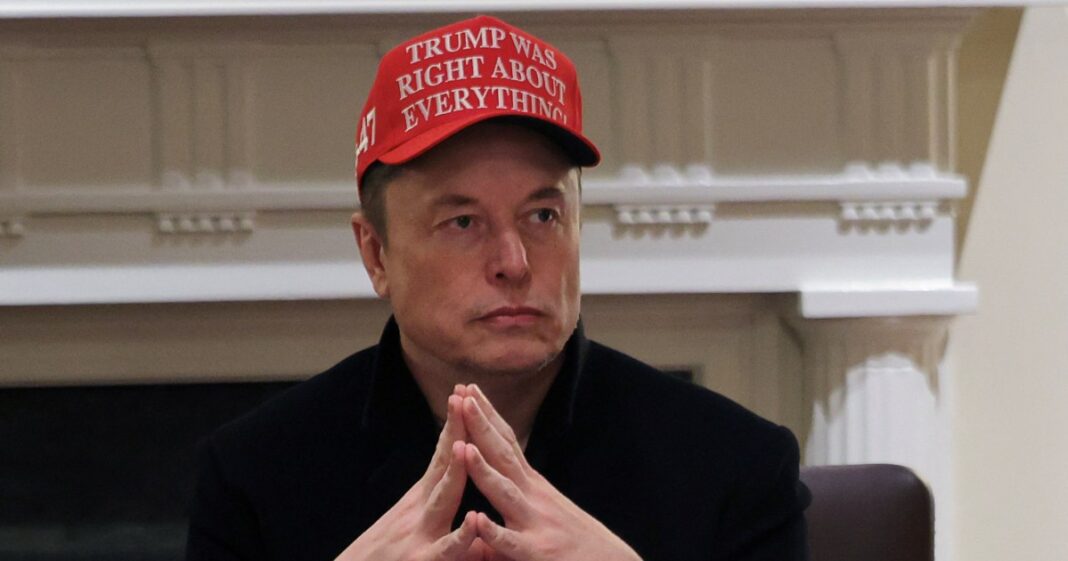Billionaire and Tesla chief Elon Musk has stepped down from his role as head of the Department of Government Efficiency (DOGE), in which he was charged with reducing federal spending, as he nears the maximum limit for his tenure as a special government adviser.
His departure comes just after his first major public disagreement with President Donald Trump over the administration’s much-touted tax-and-spending budget bill, which was passed by the Republican-controlled US House of Representatives on May 22 by a single vote.
In a post on X on Wednesday, Musk said his time with the administration had “come to an end”.
“I would like to thank President Donald Trump for the opportunity to reduce wasteful spending,” the SpaceX founder wrote.
As my scheduled time as a Special Government Employee comes to an end, I would like to thank President @realDonaldTrump for the opportunity to reduce wasteful spending.
The @DOGE mission will only strengthen over time as it becomes a way of life throughout the government.
— Elon Musk (@elonmusk) May 29, 2025
Musk, who was appointed by Trump to lead DOGE, has seen his tenure in the White House marred by controversy, in particular sparked by his attempt to dismantle the US Agency for International Development (USAID), an agency dedicated to distributing foreign aid.
With Musk’s departure, what will become of DOGE? And what legacy does the Tesla CEO leave behind?
How long was Musk at DOGE?
Musk’s term as a “special government employee” in the Trump administration meant he was only entitled to serve for 130 days in any 365-day period, and is barred from using government roles for any monetary gain.
Musk’s term has lasted just over four months, a few days short of the maximum legal limit.
In late April, Musk said he would soon shift his focus back to his own business enterprises and that his “time allocation” at DOGE would “drop significantly” starting in May.
However, Musk did note that he would spend “a day or two per week on government matters for as long as the President would like me to do so, as long as it is useful”.
Why does Musk disagree with Trump’s tax-and-spending bill?
In a clip from an interview with news channel CBS’s Sunday Morning programme, released on Tuesday, Musk revealed he was “disappointed to see the massive spending bill”.
According to him, the wide-ranging budget bill, also known as the “One Big Beautiful Bill”, increases the budget deficit and undermines his work at DOGE.
“I think a bill can be big or it can be beautiful. But I don’t know if it can be both. My personal opinion,” Musk told journalist David Pogue.
On Wednesday, Trump staunchly defended the bill. “We will be negotiating that bill, and I’m not happy about certain aspects of it, but I’m thrilled by other aspects of it,” Trump told reporters at the White House. “That’s the way they go.”
The budget bill spans more than a thousand pages and outlines various domestic policy goals favoured by the Trump administration.
Among its provisions are measures that extend tax cuts introduced during Trump’s first presidential term in 2017. The bill also boosts funding for Trump’s proposed “mass deportation” initiative and for security along the US-Mexico border.
The disagreement over the tax-and-spending bill was one of several challenges Musk has encountered during his time at the White House.
What else has Musk disagreed with the Trump administration about?
Musk ran afoul of several Trump officials during his stint at the White House, including the president’s chief trade adviser, Peter Navarro, whom he called a “moron” over Trump’s sweeping increase in trade tariffs across the globe. Musk has also stated publicly that he would be more in favour of “predictable tariff structures”, in addition to “free trade and lower tariffs”.
In April, the SpaceX founder expressed hopes for “a zero-tariff situation” between the US and Europe. Instead, Trump has threatened to impose a 50 percent tariff on imported goods from the European Union unless the two sides can agree to a trade deal.
What will happen to DOGE now?
Trump established DOGE by executive order the day he was sworn into office on January 20. With Musk’s departure, it’s unclear what fate awaits the agency, as Trump has yet to appoint anyone to replace him.
Musk was given a mandate to reduce federal funding, which included downsizing the government’s workforce, terminating government contracts and attempting to close down entire agencies. In February, he and Trump both claimed they had unearthed billions of dollars worth of fraud related to diversity and climate schemes within the government. This was proved to be largely untrue or misleading.
In his post on Wednesday, Musk said: “The DOGE mission will only strengthen over time as it becomes a way of life throughout the government.”
However, Colleen Graffy, a former US diplomat and professor of law at Pepperdine University in California, said DOGE’s future was on shaky ground. “The power of DOGE came from the world’s richest man, Musk, having the ear of the world’s most powerful person, Trump,” she told Al Jazeera. “DOGE will likely struggle along for a while, but without Musk, and with pending court cases against it, its days are numbered. It would be a poisoned chalice appointment for anyone to take. Trump’s tax cuts will dwarf any savings.”
What will Musk’s DOGE legacy be?
Musk’s role in the Trump administration has sparked a large amount of controversy.
He has overseen major reductions in the number of federal employees and the dismantling of multiple government-funded programmes – moves that have drawn widespread criticism.
“Elon Musk’s DOGE was like one of his rockets exploding soon after liftoff, thereby demonstrating how not to do things,” Graffy told Al Jazeera.
“The difference is that for one, the learning experience is paid in money; for the other, the price is paid in human lives,” she added.
A major point of criticism directed at Trump and Musk centred on their decision to severely scale back USAID’s operations.

By late February, the main offices of the agency in Washington, DC, had been essentially shut down.
Following the dismissal of roughly 1,600 employees and the placement of approximately 4,700 more on leave, staff were given just 15 minutes to gather their belongings and exit the building.
Secretary of State Marco Rubio later revealed that 83 percent of all contracts managed by USAID had been closed.
In March, a federal judge in Maryland stated that DOGE had “likely violated” the US Constitution by attempting to dismantle the agency. The judge authorised a temporary injunction to stop DOGE from proceeding with USAID-related staff reductions, building closures, contract terminations, or the destruction of USAID materials.
Lisa Gilbert, co-president of Public Citizen, a consumer rights advocacy group, described DOGE as a “mantra of destruction”.
“The legacy of Elon Musk is lost livelihoods for critical government employees, hindered American education, loss of funding for scientists and the violation of Americans’ personal privacy, all in the service of corrupt tech-bro billionaire special interests,” she told Al Jazeera.
“The carnage is even more horrifying internationally, as Musk’s chainsaw will lead to the pointless and needless deaths of likely millions of people in the developing world.”
Max Yoeli, senior research fellow in the US and the Americas Programme at Chatham House, said Musk’s brief tenure has “irrevocably altered US government”.
“DOGE’s weakening of state capacity and disruption of America’s research and development ecosystem pose lasting risks to US economic prospects and resilience, even as courts still grapple with legal issues his approach raised,” Yoeli told Al Jazeera.


